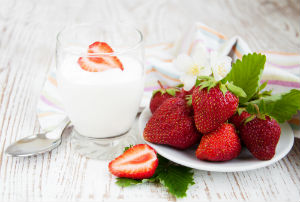
There’s a lot of confusion out there about what makes a good probiotic, so let’s take a closer look at one of the most important around: Bifidobacterium bifidum. This bacterial strain is one of the most popular, commonly added to commercial yogurts and probiotic supplements. Its effectiveness for supporting digestive health could explain its popularity. Let’s discuss more about this powerful, beneficial bacteria.
Benefits of Bifidobacterium bifidum
After years of bacteria-bashing by the mainstream medical establishment and the push toward excessive use of antibiotics, it can be challenging to understand how bacteria can actually provide benefit. [1] You’ve probably heard how probiotics aid digestion, and it’s true, they do. But, they also do a whole lot more. High levels of Bifidobacterium bifidum in your gut breakdown fiber, coat the inner lining of your intestines, and even stimulate your immune system. [2]
70%-80% of your immune response occurs in your gut, because that’s where antibiotics attack most germs and it’s where the majority of your immune cells go to fight off germs when you’re sick. [3] B. bifidum actually attach to cells of the intestine and protect the physical lining of your intestine against damage from toxins or germs. This keeps toxins and germs out of your blood and prevents them from making you sick or disrupting cellular function. On top of all this, probiotics like B. bifidum also produce important vitamins like B12, biotin, and K2. [4]
When you were born, the B. bifidum strain was already present in your intestines, protecting you from germs. In fact, it made up nearly 95% of your intestinal bacteria! B. bifidum attaches to your intestinal lining and helps digest sugar. It also keeps germs and toxins away from your blood while it stimulates your immune system. Recent research even shows that Bifidobacterium bifidum reduces the incidence of cold and flu. [5]
Antibiotic use drastically decreases B. bifidum population, as does everyday environmental factors. But with so many environmental toxins like pesticides and foods loaded with artificial sugars, adults and children alike need a supplement to maintain the best possible health. Unfortunately, today it’s tough to keep probiotic levels in your gut stable. Antibiotics, illness, artificial sugar, and pesticides can kill off those friendly gut bacteria and let killer germs like C. diff. take up residence, leading to a common illness called ‘antibiotic-associated diarrhea’ (AAD). [6] That's why it's important to supply probiotics into your intestines.
The Best Sources of Probiotic
Without balanced levels of probiotics like B. bifidum, sickness and disease follow. To keep your levels up, eat yogurt, cheese, and other fermented foods regularly. Or, take a high-quality supplement like Global Healing's Ultimate Probiotic. This probiotic supplement contains numerous bacteria strains as well as prebiotics, essential "food" for probiotics. Increasing your fiber intake through vegetables, fruits, nuts, and seeds will also help ensure a steady growth of probiotics in your intestinal tract.
References (6)
- Blake Rodgers, MD, Kate Kirley, MD, and Anne Mounsey, MD. Prescribing an antibiotic? Pair it with probiotics. J Fam Pract. 2013 Mar; 62(3): 148-150.
- Ashraf R, Shah NP. Immune system stimulation by probiotic microorganisms. Crit Rev Food Sci Nutr. 2014;54(7):938-56. doi: 10.1080/10408398.2011.619671.
- Brandtzaeg P. The mucosal immune system and its integration with the mammary glands. J Pediatr. 2010 Feb;156(2 Suppl):S8-15. doi: 10.1016/j.jpeds.2009.11.014.
- LeBlanc JG, Milani C, de Giori GS, et al. Bacteria as vitamin suppliers to their host: a gut microbiota perspective. Curr Opin Biotechnol. 2013 Apr;24(2):160-8. doi: 10.1016/j.copbio.2012.08.005.
- Langkamp-Henken, Rowe CC, Ford Al, et al. Bifidobacterium bifidum R0071 results in a greater proportion of healthy days and a lower percentage of academically stressed students reporting a day of cold/flu: a randomised, double-blind, placebo-controlled study. Br J Nutr. 2015 Feb 14;113(3):426-34. doi: 10.1017/S0007114514003997.
- Mary Hickson. Probiotics in the prevention of antibiotic-associated diarrhoea and Clostridium difficile infection. Therap Adv Gastroenterol. 2011 May; 4(3): 185-197.
†Results may vary. Information and statements made are for education purposes and are not intended to replace the advice of your doctor. If you have a severe medical condition or health concern, see your physician.







